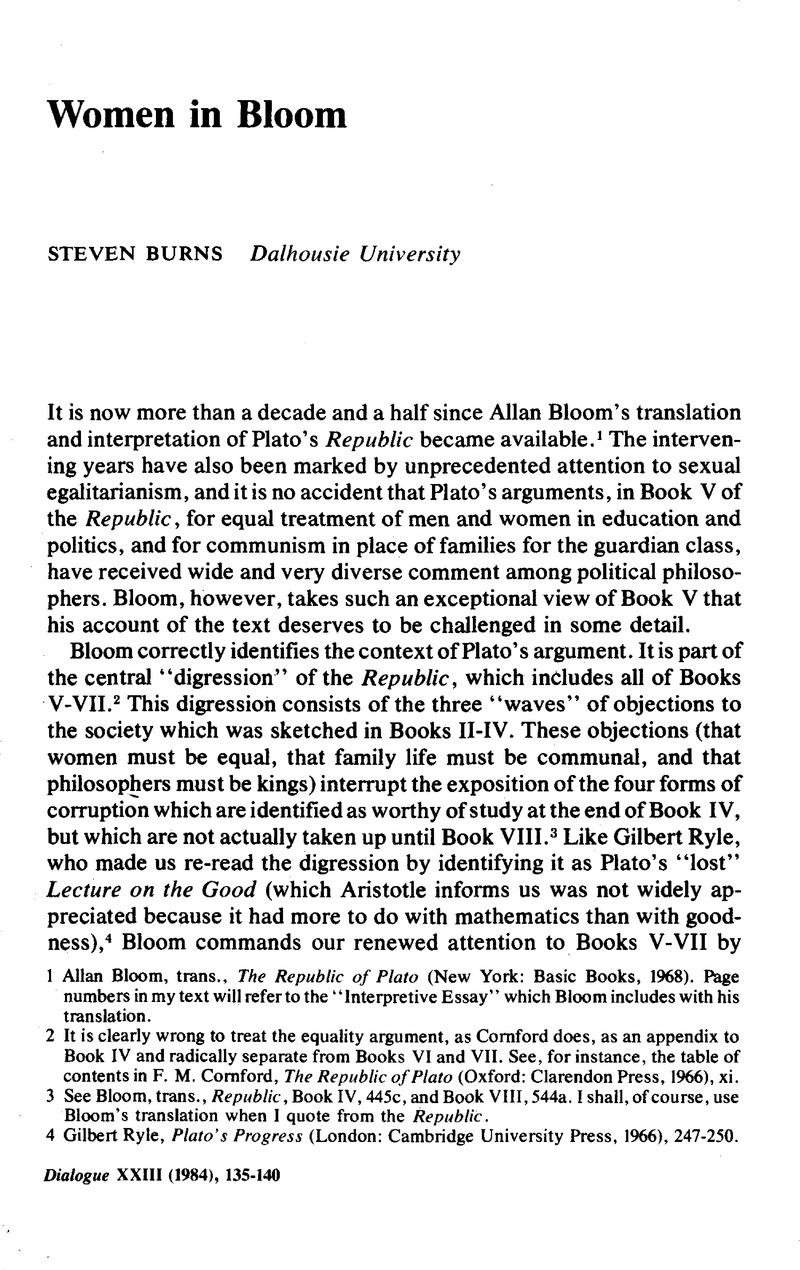No CrossRef data available.
Published online by Cambridge University Press: 05 May 2010

1 Bloom, Allan, trans., The Republic of Plato (New York: Basic Books, 1968).Google Scholar Page numbers in my text will refer to the “Interpretive Essay” which Bloom includes with his translation.
2 It is clearly wrong to treat the equality argument, as Comford does, as an appendix to Book IV and radically separate from Books VI and VII. See, for instance, the table of contents in Cornford, F. M., The Republic of Plato (Oxford: Clarendon Press, 1966), xiGoogle Scholar.
3 See Bloom, trans., Republic, Book IV, 445c, and Book VIII, 544a. I shall, of course, use Bloom's translation when I quote from the Republic.
4 Ryle, Gilbert, Plato's Progress (London: Cambridge University Press, 1966), 247–250.Google Scholar
5 455e. Bloom's translation may seem to support his case. Others have expressed it differently, however, in order to make clearer that only physical weakness is meant. George Grube, for instance, renders it: “in all of them woman is a physically weaker creature than man” (Grube, G. M. A., trans., Plato: The Republic [Indianapolis, IN: Hackett Publishing, 1974])Google Scholar.
6 Such passages are nonetheless remarkably rare. See, perhaps, Cratylus 392c,d, and Laws 781a-d and 802e. These must be weighed against other passages on the equality of women, including Meno 71d–73c mentioned above, and Laws 804e, ff. Timaeus 90e ff, might also be listed in the former category. I take the Timaeus to be a late work, and Plato's views here to reflect both his growing attachment to Pythagorean metaphysics (see the excellent section ii in Caroline Whitbeck, “Theories of Sex Difference”, The Philosophical Forum 5 [1973–1974], 54–80)Google Scholar, and his new study of Empedoclean biology (see Dickason, Anne, “Anatomy, and Destiny, : The Role of Biology in Plato's Views of Women, The Philosophical Forum 5 [1973–1974], 45–53)Google Scholar.
7 Vlastos, Gregory, ed., The Philosophy of Socrates (New York: Anchor Books, 1971), vii, and 1–21CrossRefGoogle Scholar. See also the first essays in his Platonic Studies (2nd printing, with corrections; Princeton: Princeton University Press, 1981), 3–42Google Scholar. A brilliant challenge to his view of the place of Socrates' eroticism in “platonic love” is found in Martha Nussbaum, “The Speech of Alcibiades: A Reading of Plato's Symposium”, Philosophy and Literature 3 (1979), 131–172CrossRefGoogle Scholar.
8 Lange, Lynda, “The Function of Equal Education in Plato's Republic and Laws”, in Clark, L. and Lange, L., eds., The Sexism of Social and Political Theory (Toronto: University of Toronto Press, 1979), 3–15Google Scholar, 10. She also accepts more of Julia Annas than I do. See Annas, ' valuable paper, “Plato's Republic and Feminism”, Philosophy 51 (1976), 307–321CrossRefGoogle Scholar.